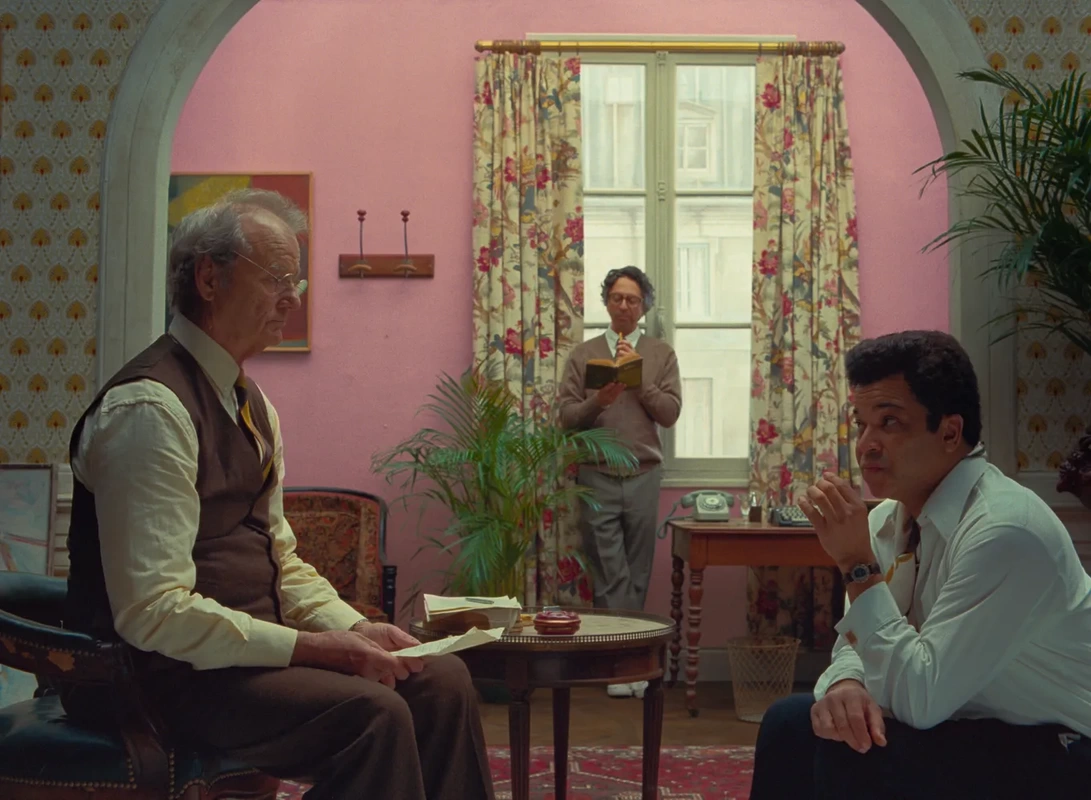Evan D.Over a career now spanning 10 films and 15 years, Wes Anderson has built himself out to be the most idiosyncratic auteurs of this era. Directors like Fincher, Villeneuve and Nolan may have their own distinct, recognizable flourishes and style, but each of those men’s work bends to commercial whims in a way that Anderson simply does not seem to care about. Love him or hate him, Wes Anderson has built a filmography in his own image, on his own terms. Most by now are familiar with the Andersonian aesthetic, one that has become more and more pronounced since the director’s fairly conventional looking debut Bottle Rocket. Much of the acclaim for Anderson’s last live action project, The Grand Budapest Hotel, stems from that film’s iconic visuals, from intricate, symmetrical sets and a color palate drenched in purples and pinks. With The French Dispatch, Anderson doubles down on his quasi-surrealist staging while simultaneously toying with that design to paint a portrait of life in a fictional French city.
The French Dispatch of the Liberty, Kansas Evening Sun is ceasing production after decades providing colorful coverage of life in the town of Ennui, France. Founder and Editor in Chief Arthur Howitzer Jr. (Bill Murray) has passed and with the end of his life comes the end of his life’s work. To commemorate a lifetime of journalism, one final edition of The French Dispatch will highlight some of the publication’s most impactful stories. Told in anthology, those stories are narrated by the iconic writers who authored them. First up is Herbsaint Sazerac (Owen Wilson) taking readers along on a bike ride through his adopted hometown, introducing readers to streets lined with vagabonds and vagrants, outsiders, much like the staff of The French Dispatch itself. Sazerac’s prologue is bright and breezy in its depiction of the darker and grittier parts of Ennui. Eccentric — and mildly tipsy — art correspondent J. K. L. Berensen (Tilda Swinton) recounts the absurd tale of criminally insane convicted murderer turned acclaimed painter Moses Rosenthaler (Benicia del Toro). Sentenced to decades in prison, Rosenthaler found salvation through art and the inspiration of his prison guard turned muse Simone (Lea Seydoux). Both the first and strongest of three chapters, Berensen’s recounting the condemned artist is as colorful as the psychedelic portraits scrawled onto the prison walls. Politics are covered by Lucinda Krementz (Frances McDormand), a sharp but aloof writer who struggles to separate herself from her work. Embedded and at times intertwined with the grumpy youths of Ennui, Krementz dryly details the efforts of student activists to bring cultural revolution to their city. Finally it is Roebuck Wright (Jeffrey Wright) covering the culinary artistry of police chef Nescaffier (Steve Park). Black, gay and — like Nescaffier — an immigrant to Ennui, Wright’s perspective has little concern for the cuisine covered in his story. Quickly a quiet dinner at the precinct turns into a zany caper, unveiling both the seediest parts of this French city and its welcoming nature. What connects these varied chapters is not any sort of thematic thread or individual’s journey, rather a deep appreciation for this singular place, the vaunted people who made it and the distinct voices of those who relayed their stories. Many, including Wes Anderson himself, have pointed to The French Dispatch as a love letter to The New Yorker and undoubtedly it is. But it’s also a beautiful portrait of the way a city can shape, inspire and bond those who choose to call it home. Anderson is famous for the rigidity with which he builds and shoots the worlds of his creation. Those worlds are so immaculately crafted, brimming with detail, they often distract from the emotional core of his films. For the first time though the setting of a Wes Anderson film is the emotional core. Every ounce of detail packed into a frame paints a clearer picture of Ennui as a living, breathing, evolving character, as the subject of fascination for Howitzer and his staff. Each vignette is self contained and tonally unique, reflective of the relationship each narrator has with this city that has adopted them as much as they, it. Light is The French Dispatch on deep character work with its actual, limited as much by the anthology structure as Anderson’s growing disinterest in that element of filmmaking. It’s that emotional distance from people he writes and directs that’s made the auteur’s recent work — specifically The Grand Budapest Hotel and Isle of Dogs — feel as spiritless as they look vibrant. With The French Dispatch Anderson has cracked the code. While none of the chapters alone packs a punch akin to the mischievous Moonrise Kingdom or sorrow drenched Royal Tenenbaums, each is an essential piece of the Ennui mosaic. The characters within are both products of and architects of that mosaic. At last a protagonist worthy of it’s author’s artistic tendencies. 9/10
Comments
|
Categories
All
Archives
April 2024
|
